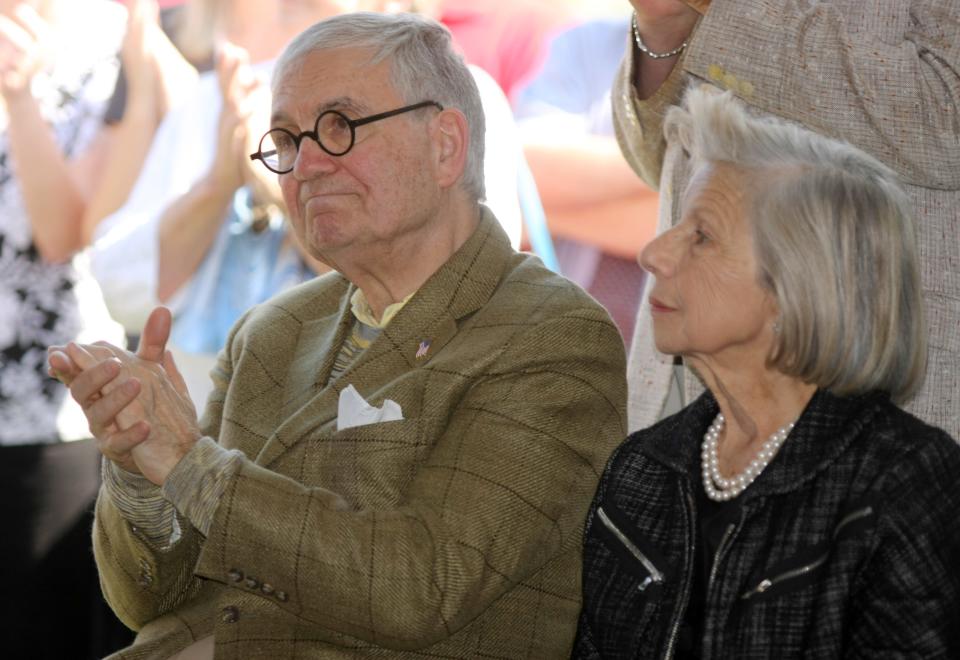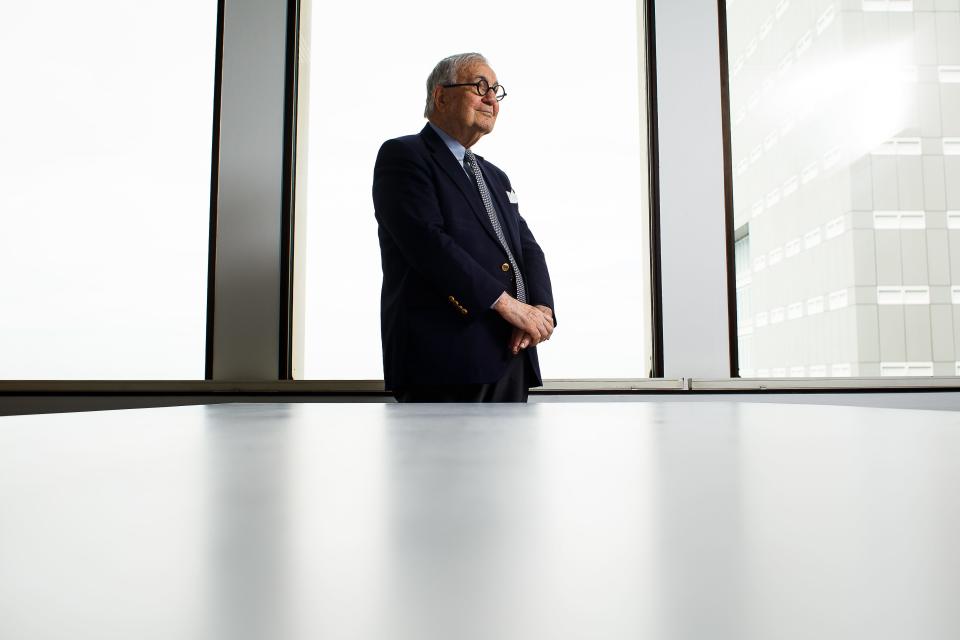What to know about John Pappajohn, the Des Moines business titan and philanthropist
He may have been Des Moines' most renowned philanthropist, gifting millions of dollars, but who was John Pappajohn?
The legendary venture capitalist and philanthropist died April 23, 2023, at age 94 at his Naples, Florida vacation home.
The Mason City native built a fortune of at least $200 million after founding financial consulting firm Equity Dynamics and venture capital fund Pappajohn Capital Resources. Pappajohn and his late wife, Mary, donated tens of millions of dollars to projects at the University of Iowa, Des Moines and other causes.
Their most visual legacy is the $30 million John and Mary Pappajohn Sculpture Park, but people who knew them said their reach extended far beyond the boardroom.
Here is what we know about the life and legacy of the legendary businessman:
More: Iowa icon in business, arts and philanthropy, John Pappajohn, dies at 94
Who was John Pappajohn?
Pappajohn was born in Greece in 1928. He came to America when he was 9 months old with his mother, Maria, following his father, George, to Mason City. He graduated from Mason City High School, then spent six years earning a degree at the University of Iowa.
Mary Pappajohn died last year.

How did John Pappajohn make his fortune?
Pappajohn went into the insurance business and after a decade decided to start his own company, Guardsman Life Insurance, in 1962, traveling the state to raise money and putting together a board of directors.
But Pappajohn, who considered himself a risk-taker, recalled in 2016 that "insurance was boring to me.” So, seven years after he founded it, he sold Guardsman to become a venture capitalist.
At the time he only had $100,000 to start his venture capital firm, according to Pappajohn's website. His fortune would grow to more than $200 million.
He launched Equity Dynamics, a financial consulting firm, then founded Pappajohn Capital Resources, a venture capital fund. A self-taught expert in medicine, he was particularly successful with his investments in medical technology and innovations such as managed care.
He was known for being hands-on with the companies he backed, helping them get on track and making sure other investors were paid before taking his own profits ― which earned him invaluable trust.
"When the day of reckoning comes, your legacy, your reputation is number uno," he told the Register in 2016.

Ambition to be the greatest Iowa philanthropist
After Pappajohn amassed his fortune, philanthropy became the biggest love for John and Mary Pappajohn. Speaking about his close friend John Pappajohn, the late David Miller said, “He has an ambition to be the biggest philanthropist this state has ever seen.
A self-described workaholic, Pappajohn kept working until at least two weeks before died.
Matt Kinley, founding partner at West Des Moines venture capital firm ManchesterStory, worked for Pappajohn Capital Resources from 1995 to 2017. He talked to Pappajohn about a deal he co-invested with in the ManchesterStory fund just two weeks ago, Kinley said.
Pappajohn managed his investment portfolio "right to the end," Kinley said.
"I usually called him to check in and we'd chat about companies and what's going on in the world. But he called me because he saw a transaction with one of the companies that both invested in. That's him working."
Jeff Flemming, the retiring director of the Des Moines Art Center, said when Pappajohn was in his 90s, he told Flemming, “‘I keep working, so I can give it away.’”
“So I think leading by example is probably one of the strongest attributes that I can share,” Fleming said.
How much money did John and Mary Pappajohn donate?
It's hard to say, but over several decades John and Mary Pappajohn donated:
$35 million since 1996 to establish entrepreneurial centers at the University of Iowa, Iowa State University, Northern Iowa, Drake University and North Iowa Area Community College.
At least $30 million to build the 4.4-acre John and Mary Pappajohn Sculpture Park to share their love of modernist sculpture with the people of Des Moines.
$26.4 million in 2009 to UI to build its Biomedical Discovery Building.
$3 million to the University of Iowa Hospitals and Clinics in 1989 for a new pavilion.
$1 million to the University of Iowa Hospitals and Clinics in 1991 for a new clinical cancer center.
$4 million to the University of Iowa College of Business for a new business building in 1992.
$5 million for a scholarship fund for disadvantaged or minority students dedicated in 1997.
$4 million to start the John and Mary Pappajohn Higher Education Center in Des Moines in 1997.
At least $5 million to Iowa State University for various causes.
What did Des Moines' mayor say about John Pappajohn's death?
On April 26, Des Moines Mayor Frank Cownie praised John and Mary Pappajohn's "love for Des Moines.'
"The city of Des Moines lost a great friend, generous benefactor and beloved member of our community in the passing of John Pappajohn," Cownie said. "The tremendous contribution to Des Moines of the John and Mary Pappajohn Sculpture Park is one of our most frequented parks, enjoyed by thousands of visitors every year."
But the couple's legacy "goes well beyond their beautiful sculpture park. Their mutual love for Des Moines and Iowa can be seen in dozens of contributions and gifts they bestowed on communities, hospitals and universities throughout our state. We will miss them both and are forever grateful and indebted to them."
How did John Pappajohn change entrepreneurship in Iowa?
Pappajohn was recognized as one of the country's leading venture capitalists, but he kept his business and home in Iowa. In 1996, as Iowa's economy still reeled from the farm crisis and its economy, in Pappajohn's words, was "lower than whale poop in the bottom of the ocean," he provided funding to start five entrepreneurship centers at Iowa's Universities. While he funded a center at the University of Iowa, he gave to more than just his alma mater.
Centers were established at UI, Iowa State University, Drake University, Northern Iowa University and North Iowa Area Community College.
The centers and their affiliated programs have helped launch thousands of businesses, and he was still giving to them as late as 2021, donating another $10 million.
"Iowa has a lot of talent, a lot of hard-working people, but needed a jump start on the entrepreneurial side, Kinley said. "He exposed people to it early so they can understand this can be a career path."
What do John Papajohn's friends say about his legacy?
Nowhere is Pappajohn's legacy more apparent than the sculpture park. It's the most visible sign of his legacy, Fleming said.
In the process, they helped complete the transition of the Western Gateway, a once-seedy section of downtown, into a symbol of a city on the rise, a place that has become increasingly attractive to the entrepreneurs Pappajohn nurtured and who in turn helped him earn his fortune.
“Their amazing contributions made it one of the best sculpture parks in the country," Fleming said. “Everything around it has been renovated. So it has economically transformed that community, that neighborhood.”
But Pappajohn's legacy will be most felt in the gifts and words of wisdom he and his wife shared out of public view, said those who knew him.
In the end, he will likely be known most for his impact on Iowa's entrepreneurial community and the venture capital business, Kinley said.
"The people that he's worked with have been impacted," Kinley said. "But there's a lot of branches on that tree. He's had impact across a lot of folks."
Philip Joens covers retail, real estate and RAGBRAI for the Des Moines Register. He can be reached at 515-284-8184, pjoens@registermedia.com or on Twitter @Philip_Joens.
This article originally appeared on Des Moines Register: What to know about late Des Moines venture capitalist John Pappajohn

